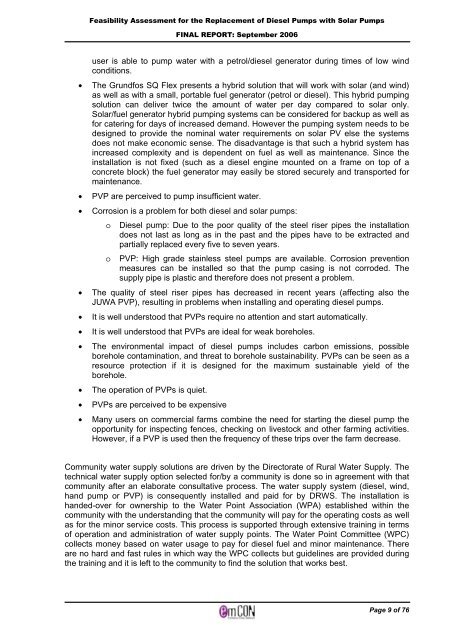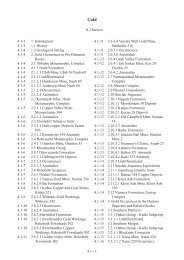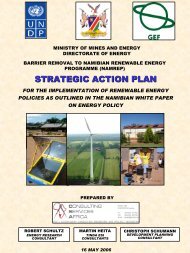Solar PV water pumping study - FINAL REPORT ... - UNDP, Namibia
Solar PV water pumping study - FINAL REPORT ... - UNDP, Namibia
Solar PV water pumping study - FINAL REPORT ... - UNDP, Namibia
Create successful ePaper yourself
Turn your PDF publications into a flip-book with our unique Google optimized e-Paper software.
Feasibility Assessment for the Replacement of Diesel Pumps with <strong>Solar</strong> Pumps<br />
<strong>FINAL</strong> <strong>REPORT</strong>: September 2006<br />
user is able to pump <strong>water</strong> with a petrol/diesel generator during times of low wind<br />
conditions.<br />
• The Grundfos SQ Flex presents a hybrid solution that will work with solar (and wind)<br />
as well as with a small, portable fuel generator (petrol or diesel). This hybrid <strong>pumping</strong><br />
solution can deliver twice the amount of <strong>water</strong> per day compared to solar only.<br />
<strong>Solar</strong>/fuel generator hybrid <strong>pumping</strong> systems can be considered for backup as well as<br />
for catering for days of increased demand. However the <strong>pumping</strong> system needs to be<br />
designed to provide the nominal <strong>water</strong> requirements on solar <strong>PV</strong> else the systems<br />
does not make economic sense. The disadvantage is that such a hybrid system has<br />
increased complexity and is dependent on fuel as well as maintenance. Since the<br />
installation is not fixed (such as a diesel engine mounted on a frame on top of a<br />
concrete block) the fuel generator may easily be stored securely and transported for<br />
maintenance.<br />
• <strong>PV</strong>P are perceived to pump insufficient <strong>water</strong>.<br />
• Corrosion is a problem for both diesel and solar pumps:<br />
o Diesel pump: Due to the poor quality of the steel riser pipes the installation<br />
does not last as long as in the past and the pipes have to be extracted and<br />
partially replaced every five to seven years.<br />
o <strong>PV</strong>P: High grade stainless steel pumps are available. Corrosion prevention<br />
measures can be installed so that the pump casing is not corroded. The<br />
supply pipe is plastic and therefore does not present a problem.<br />
• The quality of steel riser pipes has decreased in recent years (affecting also the<br />
JUWA <strong>PV</strong>P), resulting in problems when installing and operating diesel pumps.<br />
• It is well understood that <strong>PV</strong>Ps require no attention and start automatically.<br />
• It is well understood that <strong>PV</strong>Ps are ideal for weak boreholes.<br />
• The environmental impact of diesel pumps includes carbon emissions, possible<br />
borehole contamination, and threat to borehole sustainability. <strong>PV</strong>Ps can be seen as a<br />
resource protection if it is designed for the maximum sustainable yield of the<br />
borehole.<br />
• The operation of <strong>PV</strong>Ps is quiet.<br />
• <strong>PV</strong>Ps are perceived to be expensive<br />
• Many users on commercial farms combine the need for starting the diesel pump the<br />
opportunity for inspecting fences, checking on livestock and other farming activities.<br />
However, if a <strong>PV</strong>P is used then the frequency of these trips over the farm decrease.<br />
Community <strong>water</strong> supply solutions are driven by the Directorate of Rural Water Supply. The<br />
technical <strong>water</strong> supply option selected for/by a community is done so in agreement with that<br />
community after an elaborate consultative process. The <strong>water</strong> supply system (diesel, wind,<br />
hand pump or <strong>PV</strong>P) is consequently installed and paid for by DRWS. The installation is<br />
handed-over for ownership to the Water Point Association (WPA) established within the<br />
community with the understanding that the community will pay for the operating costs as well<br />
as for the minor service costs. This process is supported through extensive training in terms<br />
of operation and administration of <strong>water</strong> supply points. The Water Point Committee (WPC)<br />
collects money based on <strong>water</strong> usage to pay for diesel fuel and minor maintenance. There<br />
are no hard and fast rules in which way the WPC collects but guidelines are provided during<br />
the training and it is left to the community to find the solution that works best.<br />
Page 9 of 76




